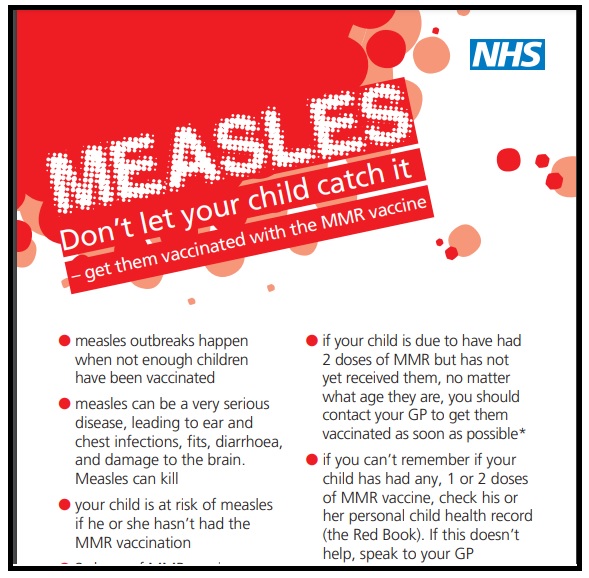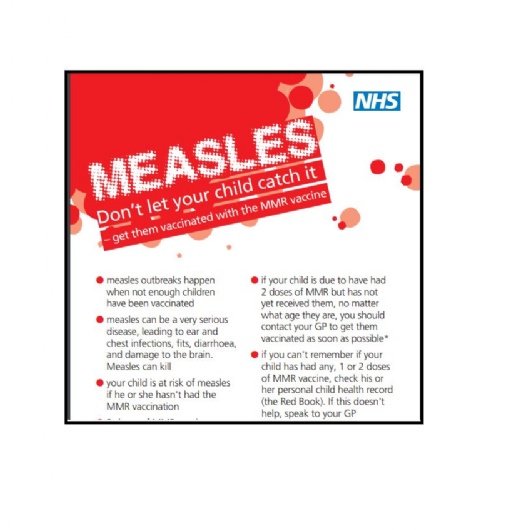|
Vaccination against measles (MMR)
The most important thing to help prevent the spread of measles is to ensure that everyone is vaccinated.
It is important to have the MMR vaccine and we are asking you to encourage parents / guardians to take up the offer of an MMR vaccine if their children are not fully vaccinated.
The free MMR vaccine is a safe and effective way of protecting against measles, as well as mumps and rubella. The best way to prevent children getting measles is to make sure they have their two MMR vaccines on time – the first at 1 year of age and the second at 3 years, 4 months.
If parents / guardians and their children have missed these vaccines, it’s not too late. If parents / guardians are unsure if their child has received the MMR vaccine, they should check the ‘Red Book’ which is updated when vaccinations have been given or contact their GP practice.
Parents / guardians can ask for the free vaccine from their GP if they or their children aren’t up to date.
For more information about measles, visit the Healthier Together website or the NHS.uk website.
For more information on the MMR vaccination, visit: www.nhs.uk/mmr.

The following links are also helpful for parents / guardians. They include information about measles and MMR.
In the first instance, parents / guardians should contact their GP practice to arrange an MMR vaccination
The Sheffield School Age Immunisation Service provides some clinics. Parents / guardians are advised to follow the link below for further information and to check the vaccinations available for specific age groups.
https://www.sheffieldchildrens.nhs.uk/services/school-nursing/school-age-immunisation-service/.
Symptoms of Measles
Although the health risk to children is low, measles spreads very quickly and easily. As a precautionary measure, it is helpful to remind parents / guardians of the symptoms of measles to be aware of and to ask them to check that they and their children have had two doses of the free MMR vaccine, which gives lifelong protection against measles, mumps, and rubella.
Parents / guardians are being advised to watch out for the symptoms of measles in their children and act if they suspect they have the infection. Measles usually starts with cold-like symptoms, followed by a rash which usually starts on the face or behind the ears a few days later. Some people may also get small spots in their mouth.
The first symptoms are:
- high fever
- sore, red, watery eyes
- cough
- aching and feeling generally unwell
- a blotchy red / brown rash on white skin - it may be harder to see or more subtle on brown and black skin
Anyone with symptoms that could be measles is advised to stay at home and phone their GP or NHS 111 for advice, rather than visiting the surgery or A&E.
This is because measles spreads very quickly and easily and so it is important to try and prevent the illness spreading further.
People with symptoms should also especially try to stay away from areas where they could come into contact with vulnerable people such as schools, nurseries, or care homes.
They should stay away from GP surgeries and hospital emergency departments as they could spread the illness to vulnerable people.
If it is absolutely necessary for them to bring their child into their GP surgery, a walk-in centre or a hospital emergency department, they should not use public transport to get there as they will risk infecting others. They should ask NHS 111 or 999 for help with transport if they need to be seen by a doctor.
As soon as they arrive, they should inform reception that they are infectious so that they can be kept away from other people to minimise the chances of the infection spreading.
|


